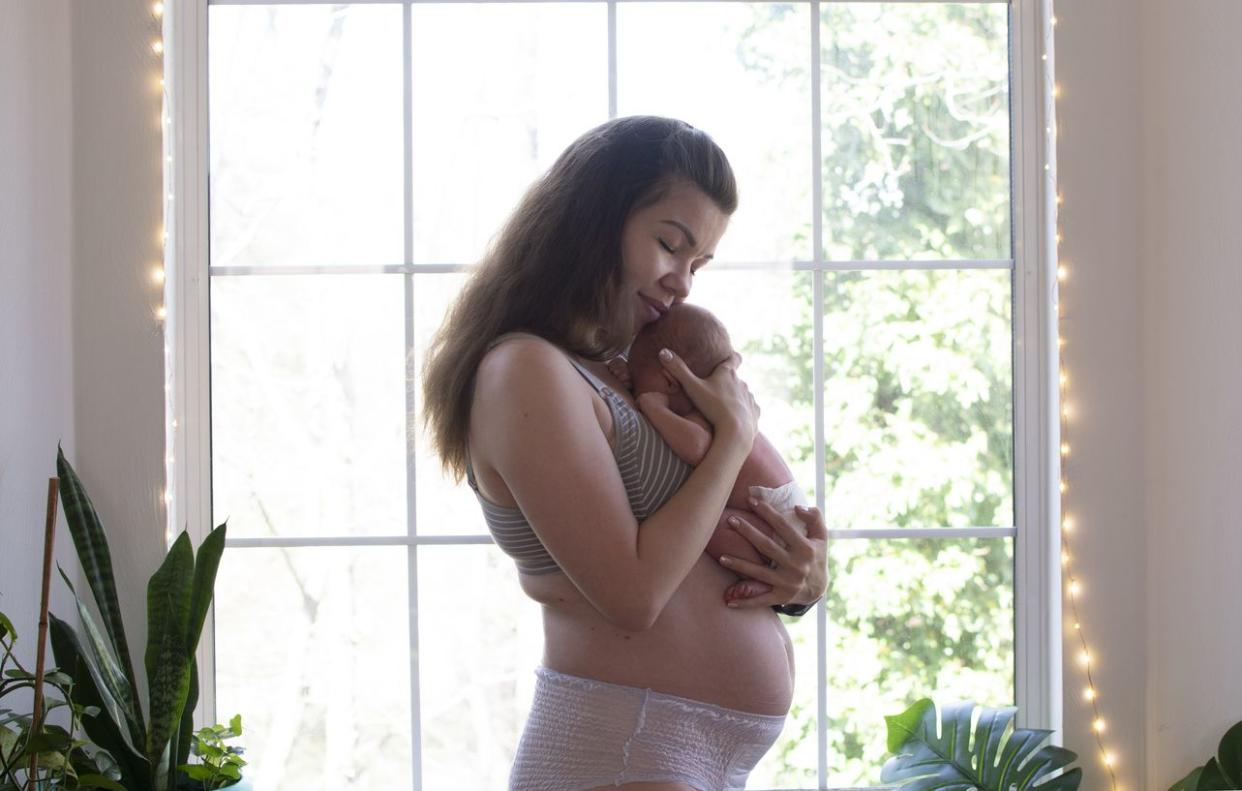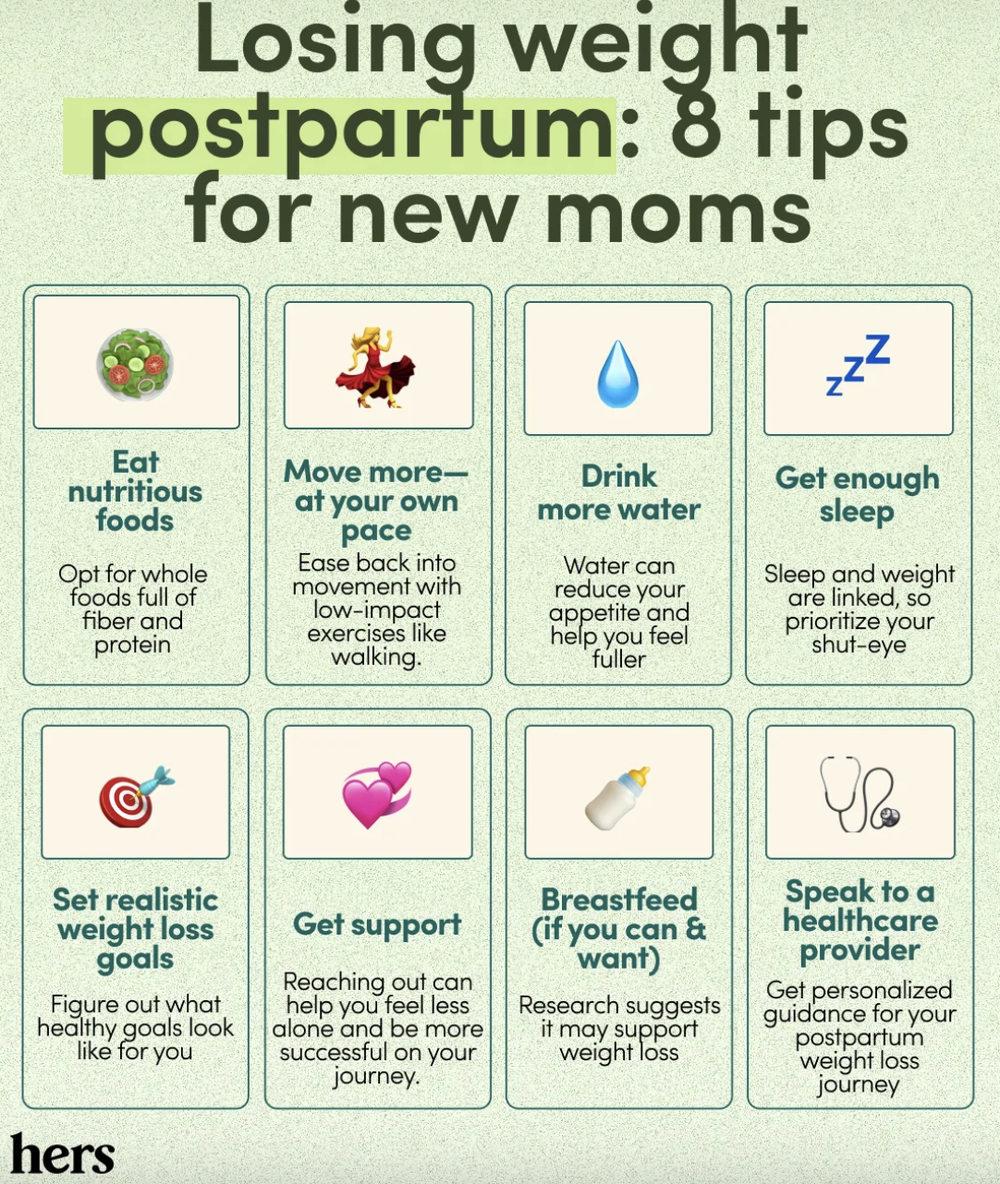8 Postpartum Weight Loss Tips: What to Expect After Expecting

Weight loss can be tricky at the best of times, without the additional challenges of postpartum life — looking at you, sleepless nights! But while it’s healthy to gain weight during pregnancy (sometimes pretty rapidly, like at the end of the third trimester), slow postpartum weight loss is advised.
Reach for nutritious foods, sloowwwly add more movement when it’s safe to do so, drink plenty of water and get enough sleep — ha, we know, but one can dream.
Below, we’ll dive into how long it takes to lose “baby weight,” when it’s safe to start losing weight after baby and lots of postpartum weight loss advice to help along the way.
How Long Does It Take to Lose Baby Weight?
The time it takes to lose baby weight (the weight you put on while pregnant) is different for everyone. We know that’s not really a solid answer, but it’s true.
It depends on factors like:
How much weight you gained during pregnancy
The type of birth you had (C-section or vaginal delivery, for example, as this determines when you can safely start physical activity again)
Whether you can or decide to breastfeed
You don’t need to lose any extra weight you gained during pregnancy right away. In fact, rapid weight loss is never advised.
Postpartum Weight Loss Timeline
There’s no set postpartum weight loss timeline to follow. But in general, women tend to lose baby weight gradually in the months after childbirth. Research shows that 42 percent of women return to their pre-pregnancy weight one year after giving birth.
Women who had a healthy body weight pre-pregnancy and put on more than 10 pounds (which is recommended and healthy, BTW) might work toward their pre-pregnancy weight over a 12-month period after birth.
That’s right, a year! It’s also totally fine if it takes longer. Don’t worry about rushing the process.
When Is It Safe to Consider Postpartum Weight Loss?
There’s no set number of days after childbirth when it’s safe to consider postpartum weight loss. Your healthcare provider can tell you when it’s safe for you. It’ll depend on how your recovery from birth is going and other factors, such as whether you’re breastfeeding.
You can start eating nutritious foods right away, but adding more movement into your day should happen slowly.
Generally, women who had uncomplicated deliveries may be able to start physical activity four to six weeks after birth — or when they feel comfortable. However, if you had a complicated delivery or C-section, wait until your postpartum check-up around the six-to-eight-week mark. Your provider can let you know if it’s safe to start adding more movement into your routine.
Should You Lose Weight After Giving Birth?
We hate to add to your to-do list, but in most cases, it’s advisable to lose the weight you’ve gained during pregnancy after giving birth. Postpartum weight retention (when you don’t lose the weight you gained while pregnant) ups your odds of:
Diabetes
Osteoarthritis
Some cancers
Cardiovascular disease
Problems in future pregnancies (such as preeclampsia, gestational diabetes mellitus, C-section delivery and stillbirth)
Weight loss can be tricky, especially after childbirth. A 2021 study found that metabolic rate — how much energy our body uses — is lower during postpartum than pregnancy. This study was small, though, with only 25 participants, so more research is needed. Still, there are steps you can take to make it happen in a healthy and sustainable way. Keep reading for the know-how.

How to Lose Weight After Pregnancy: 8 Tips
No one said losing weight after having a baby was easy, but it’s doable. And you just grew a brand-new human — you’ve got this! Here’s how to lose baby weight in a slow, steady and healthy way.
1. Eat Nutritious Foods
A healthy eating plan is the cornerstone of any weight loss journey. Opt for whole foods full of fiber and protein like:
Fruits
Veggies
Legumes
Whole grains
Lean protein
Upping your protein intake in particular can help with weight loss. Find out how much protein to eat to lose weight in our guide. Outside of your main meals, reach for healthy snacks like:
Nuts
Seeds
Hard-boiled eggs
Dried fruit
Oatmeal
Yogurt
Make sure you’re eating enough. If you’re breastfeeding, you generally need 330 to 400 more calories a day compared to pre-pregnancy. We’re not saying you should count calories, though. It’s all about eating nutritious foods that make you feel full, satisfied and energized.
2. Slowly and Carefully Get More Movement
Be sure to ease back into physical movement — there’s no need for HIIT (high-intensity interval training) classes or 20-mile runs here. Try low-impact exercises like walking and start gradually introducing core, glute and pelvic floor exercises.
When we say gradually, we mean graaaaaadually. For instance, you might increase how much movement you get by five minutes a session each week and slowly upping the intensity.
Your end goal? Aim for 150 minutes a week of moderate-intensity aerobic exercise — up to 30 minutes a day, five days a week — and three sets of muscle-strengthening exercises twice a week. But be sure to slowly build up to these numbers.
We know this is a lot. Don’t push yourself too hard and start where you’re at.
If you did high-intensity aerobic workouts like running before pregnancy, you can slowly get back to this activity level too. But again, slow and steady should be your mantra. See our blog on walking for weight loss for more tips.
3. Drink More Water
Yup, that’s right. The humble glass of water can help with losing weight after pregnancy. Water can reduce your appetite and help you feel fuller. A 2022 review of studies found that drinking about 17 ounces of water before meals can increase weight loss by two to five pounds over three months.
Staying hydrated is especially important if you’re breastfeeding, as your body’s using water for breast milk production. Aim for roughly eight glasses of water a day. Need a reminder? Try to drink a glass of water every time you settle in to breastfeed your new baby.
4. Get Enough Sleep (or as Much as You Can)
Try to get plenty of sleep. We know — practically impossible with a newborn, right? But hear us out. Sleep and weight are tightly linked, so it’s worth getting some extra shut-eye whenever possible. A lack of sleep can increase ghrelin (the hunger hormone) and decrease leptin, the hormone responsible for satiety (a feeling of fullness).
Sleeping for short periods (like one or two hours at a time rather than through the night) is linked to more postpartum weight retention. And women who get less than five hours of sleep at six months postpartum have up to three times the risk of retaining more than 11 pounds of weight. If a full night’s rest isn’t currently in the cards, try trading off childcare duties with a partner or family member during the day so you can take a power nap.
5. Set Realistic Weight Loss Goals
Be extra kind to yourself during this time. You don’t need to “snap back” to your pre-pregnancy weight right away. And since healthy body weight is a range, you don’t need to hit the exact number you used to weigh.
Talk to your medical provider about a healthy weight loss goal, including how much weight you should aim to lose each week.
If you’re wondering how to lose weight fast after pregnancy, you won’t find those tips here. As mentioned, slow and steady is the safest and most sustainable approach.
6. Get Support
Reaching out for support can help you feel less alone and be more successful on your postpartum weight loss journey.
Support can be from a partner, a family member, friends, a mental health professional or in the form of a structured weight loss program.
Research shows that people are more likely to stick to programs with social support, those that take attendance and those that focus on changing your eating habits. And programs combining nutritious eating with more movement can lead to greater weight loss after 12 months than those that focused on just one element alone. Just something to look out for if you’re considering one.
7. Breastfeed If You Can and Want to
If you can and want to, breastfeed your baby. Not only can this be good for the baby, but it may also promote weight loss after pregnancy. A 2019 study looked at 370 mothers who breastfed their babies for at least a month. Moms who fully breastfed for at least three months had lower postpartum weight retention — they lost more weight — compared to those who breastfed for one to three months.
Not everyone can or wants to breastfeed, though. If that’s you, no sweat. You can focus on other weight loss interventions, like eating nutritious foods and slowly adding more movement.
8. Speak to a Healthcare Provider
A healthcare provider can share personalized advice on how to lose weight postpartum. They’ll take into account any health conditions you might have and circumstances around your birth and breastfeeding journey. If you’re not breastfeeding, weight loss medications may be suitable, depending on your weight and overall health. A medical professional can determine if these are safe for you.
How to Lose Weight After C-Section
How you lose weight after a cesarean section may look a little different from other types of birth, but the key ideas are the same. It may take longer to recover — a C-section is major surgery, after all — which might affect when you can start reintroducing physical activity back into your schedule.
Make sure to get the all-clear from your provider and follow these pointers:
Opt for nutritious whole foods
Slowly add more movement when it’s safe to do so
Get plenty of sleep (or as much as you can with a newborn)
Drink more water
Get support from loved ones and guidance from healthcare professionals
Breastfeed if you can and want to
Again, if you’re ever unsure about what to do or not to do after a C-section, get in touch with your provider.
Postpartum Weight Loss: Wrapping It Up
Postpartum weight loss can feel like yet another thing on a new mom’s to-do list. Self-care is crucial, and for some, this means making time to focus on your well-being. But for optimum health, you’ll want to slowly lose the weight you gained while pregnant.
Here’s the TL;DR on the best way to lose weight after baby:
Slow and steady wins the race. It’s a well-worn saying for a reason. Post-pregnancy weight loss doesn’t — and shouldn’t — happen overnight. There’s no set time frame, though. Work with your provider to set a realistic weight loss goal.
Focus on self-care basics. Choose healthy foods, drink plenty of water, get more movement and try to rest when you can.
Slowly reintroduce movement when you’re ready. If you had an uncomplicated birth, you might be able to start doing light exercise four to six weeks after birth. If you had a C-section or complications, wait until your postpartum check-up at six to eight weeks to get the doc’s go-ahead.
Don’t be afraid to ask for help. You’re not alone in this — even if you’re reading this during a solitary 3 a.m. feed. Don’t be afraid to get support from loved ones, healthcare professionals and weight loss programs.
Weight loss journeys are a lot like pregnancy — slow and steady but oh-so rewarding. If you’re starting to look into your options, know there are plenty of weight loss treatments available.
This article originally appeared on ForHers.com and was syndicated by MediaFeed.org.
